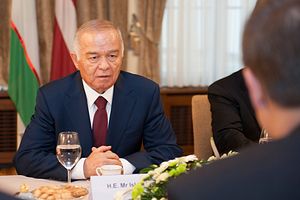On Friday, Uzbekistan’s President Islam Karimov was again sworn into office, according to regional news outlets. The ceremony was held at a joint meeting of the Oliy Majlis, the Uzbek Parliament, and attended by ministers, members of the Central Election Commission (CEC), and judges of the Constitutional Court. According to Trend.az, “CEC chairman Mirza-Ulugbek Abdusalomov delivered a presidential document to Karimov. Then President Karimov took an oath.”
The attendance of members of the CEC and Constitutional Court is nothing if not ironic. Karimov has sustained a staged version of democracy through a series of strategic constitutional changes and referendums by virtue of the fact that he holds absolute power in the country.
Karimov’s election history is telling in this regard. In 1990, Karimov first came into office as president of the Uzbek Soviet Socialist Republic. He then won handily Uzbekistan’s first election as an independent country in 1991. In 1996 he extended his term via referendum and was reelected in 2000 to a seven-year term. He delayed the 2007 election by a technicality until December, and then won despite a two-term limit in the country’s constitution. The argument then was that his 1991 election did not count as one of his two “consecutive terms” because it was before the current constitution was put in place in 1992.
In 2011 Karimov oversaw a change in the constitution, which shortened the presidential term to five years. Last month, Karimov stood for election and, shocking none, won with a reported 90 percent of the votes. Before the election The Guardian commented that Karimov was “guaranteed to win [in] a landslide.”
According to the OSCE preliminary election monitoring report, another technicality allowed him to stand for reelection, this time related to the definition of the word “term”:
While the Constitution restricts the president to two consecutive terms in office, the incumbent is standing for re-election for the third time under the current Constitution… officials explained to the OSCE/ODIHR LEOM that the notion of ‘term’ means the exact number of years and, as the previous presidential term was seven years while the next will be five years, these cannot be considered as two consecutive terms.
As Elmurad Kasym commented in The Diplomat ahead of the election:
True, the Office for Democratic Institutions and Human Rights (ODIHR) has consistently cited the lack of competition, abuse of power, and obvious inconsistencies with Uzbek legislation during various elections past. However, the reports of foreign observers have changed nothing. After all, no report is strong enough to contend with the remarkable compatibility over a quarter of a century between the “popular vote” and the plans of the powers that be.
Kasym’s sarcasm drips in the last sentence but humor aside, Karimov’s grip on power is tight and unwavering. As Umar Farooq reported for Foreign Policy last week, Karimov’s “unrelenting pursuit of his critics has pushed peaceful opposition out of the country.”
Farooq says that “pious old Uzbek dissidents pray for the president’s life to end, while others hone their skills as jihadis in conflicts across Asia and the Middle East.”
What happens next in Uzbekistan is a very important question. The country is Central Asia’s most populous, though its economy lags behind Kazakhstan. Karimov has succeeded in silencing all internal opposition, hunted those who have fled, and sidelined even his own eccentric daughter. Despite the 2005 massacre at Andijan putting a damper on relations with the West, it seems things are bounding back now. In January the U.S. announced that Uzbekistan would receive over 300 Mine-Resistant Ambush Protected Vehicles (MRAPs). Nisha Biswal, the U.S. assistant secretary of state for Central Asia, categorized U.S. policy toward Uzbekistan as “a combination of the right balance of pressure, partnership and a certain amount of strategic patience in how change can take place.”
Bruce Pannier summarized Karimov best in his impressive biography of the leader:
For years, Karimov seemed odd and unpredictable to me. He was a fickle ally, potentially volatile, a bully who was condescending to fellow Central Asian presidents, brutally candid and politically incorrect, remorseless and unrepentant when confronted with evidence of the violence of his regime, easily insulted, and quick to exact vengeance for perceived slights.
Karimov may be able to win perpetual presidential terms, but (while it is little comfort to Uzbek dissidents and exiles now) he will not live forever.

































